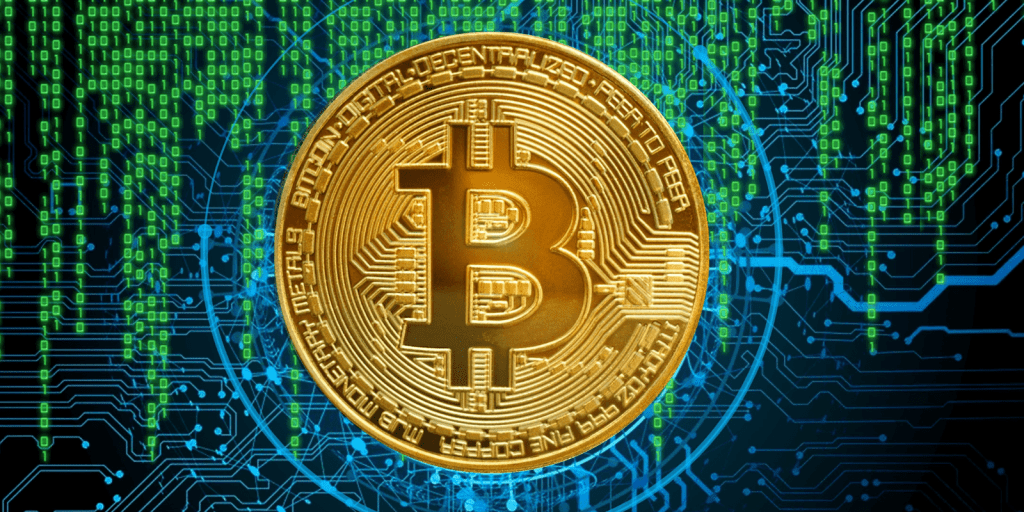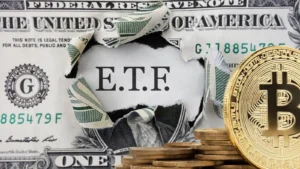Bitcoin has had an unpredictable journey since its inception in 2009. It was created as a means to make available a decentralized currency that could be used without the intervention of banks or other monetary institutions. However, some early problems with bitcoin caused it to lose favor with many people. Bitcoin has come back and is now being accepted by more businesses. We will look at the past, present, and future of bitcoin in this blog post! We will look at the past, present, and future of bitcoin in this blog post!
Introduction to Bitcoin
Thirteen years ago, Bitcoin emerged — a decentralized digital asset and payment system that enables transactions without the need for third-party involvement. For this reason, it is foundational to many other peer-to-peer networks today. Transactions are verified by network nodes through cryptography and recorded in a public dispersed ledger called a blockchain.

History of Bitcoin
Bitcoin, conceptualized by Satoshi Nakamoto in 2009 and released to the world soon after, is an innovative digital asset and revolutionary payment system. Its peer-to-peer network grants users direct access; thus eliminating the need for a middleman of any kind.
The history of Bitcoin began with a paper published in 2008 by pseudonymous developer Satoshi Nakamoto. This paper detailed methods of using a peer-to-peer network to generate what was described as “a system for electronic transactions without relying on trust”.
The current situation of Bitcoin
Bitcoin is going through a difficult time right now. Prices have been dropping and there is a lot of uncertainty in the air. Some people are calling it a bubble that’s about to burst, while others are confident that it will rebound soon.
Whatever happens, one thing is for sure: Bitcoin is here to stay. It’s been around for nearly 10 years now and has shown itself to be a resilient cryptocurrency. Regardless of the current volatility, there’s no doubt that it has a bright future ahead. So if you’re thinking to buy Bitcoin in Dubai or anywhere else in the world, now might be a good time to do so. Just make sure you’re prepared for the ups and downs!
Bitcoin is soon going to rise again because people are starting to realize its true potential. Unlike traditional currency, bitcoin is digital, global, and secure. This makes it the perfect choice for online transactions and provides a much safer option than credit cards. Additionally, because there is a finite number of bitcoin that can be created, their value is likely to continue to increase as more and more people start to use them.
Reasons for the rise of bitcoin
1. Increased global uncertainty
One of the primary reasons for the rise of bitcoin is increased global uncertainty. In recent years, we have seen a number of major political and economic events that have created uncertainty around the world. These events include Brexit, the election of Donald Trump, and the ongoing trade war between the United States and China. As a result of this uncertainty, many people are looking for alternative investments that are not as volatile as traditional stocks and bonds. Also, after recent conflicts between Russia and Ukraine, many people were seen planning to sell Bitcoin in Dubai and other parts of the world due to uncertain conditions.
2. The failure of traditional financial institutions
Another reason for the rise of bitcoin is the failure of traditional financial institutions. In 2008, we saw the collapse of Lehman Brothers, one of the largest investment banks in the world. This event led to a global financial crisis and caused many people to lose faith in traditional financial institutions. Since then, we have seen a number of other scandals involving major banks and other financial institutions, which has only further eroded confidence in these institutions.
3. The increasing popularity of cryptocurrency
Cryptocurrency is becoming increasingly popular all over the world. This is due to a number of factors, including the fact that it is not controlled by any central authority and is therefore not subject to government regulation. Additionally, cryptocurrency is often seen as a more secure form of investment than traditional fiat currency, as it is not susceptible to inflationary pressures.
4. The growing acceptance of bitcoin
In addition to its increasing popularity, bitcoin is also becoming more widely accepted as a form of payment. While there are still some businesses that do not accept bitcoin, its use is growing rapidly all over the world. This is due in part to the fact that more people are aware of bitcoin and how it works, but also because businesses are beginning to see its potential as a way to avoid high transaction fees charged by traditional payment. So, recently change in a trend has been noticed and many people shifted to buy Bitcoin in Dubai as well as all over the world to pay for products and services.
5. The advantages of bitcoin over fiat currency
Bitcoin has a number of advantages over fiat currency, which is another reason why its use is growing so rapidly. For one thing, bitcoin is not subject to inflationary pressures like fiat currencies are. Additionally, bitcoin is much more secure than fiat currencies, as they cannot be counterfeited or stolen like paper money can be. Finally, bitcoin offers lower transaction fees than traditional payment processors such as Visa or Mastercard.
Potential Future
Bitcoin is still in its early developmental stages, and there is a lot of potentials for it to grow in the future. For example, many people believe that Bitcoin could eventually become a global currency that is used for transactions between countries. Additionally, there are many other potential applications for Bitcoin that have not been explored yet, such as using it for micropayments or as a way to store value. So overall, the future looks bright for Bitcoin and its potential continues to grow.
1. Continued Bitcoin expansion
Bitcoin can only achieve a certain level of success due to its limited supply – the maximum number of coins that will ever exist is 21 million. If growth continues at such an exponential pace, this limit could be reached within just a few decades.
This does not mean that Bitcoin’s potential is limited–far from it. The finite number of bitcoin actually makes it a more scarce and valuable resource, which can only increase its long-term potential. But it does mean that Bitcoin cannot keep expanding indefinitely and that its future value is ultimately capped.

2. Interoperability
Bitcoin is still in its early developmental stages and has yet to experience widespread adoption. However, there are a number of factors that could affect its future potential, including interoperability.
Interoperability refers to the ability of different systems to communicate with each other. In the context of Bitcoin, it would mean that various blockchains could interact with each other, allowing for the exchange of digital assets between different platforms. This would be a major development for the cryptocurrency market, as it would increase liquidity and provide greater opportunities for investors.
However, there are still some challenges that need to be addressed before interoperability can be implemented on a large scale. For example, there is no standardized protocol for blockchain communication.
3. Continued Digitalization of Life
The digitalization of life will only increase the potential for bitcoin and other cryptocurrencies. With more and more devices coming online and being interconnected, there is a greater need for secure, decentralized systems for exchanging value.
Bitcoin and other cryptocurrencies are well-suited to this task, as they are trustless networks that allow for secure and anonymous transactions. These features will become increasingly important as we move further into the digital age.
Crypto users and reasons for expansion
1. Continued technological innovation
Bitcoin is expanding because it is a new and innovative technology that allows for secure, anonymous transactions.
Additionally, the value of bitcoin is increasing because there is a limited supply of bitcoin that will ever be mined. This makes it a deflationary currency, which means that its value will increase over time as demand for bitcoin increases.
2. Increased legitimacy through regulations
Bitcoin is also expanding because it is a legitimate form of currency that is not regulated by governments. Regulations would only hurt bitcoin’s expansion because they would legitimize it as a government-controlled currency, which is not what Bitcoin represents.
3. Govt. exploring CBDCS[Central bank digital currency
The Government exploring CBDCS[Central bank digital currency] is a sign that they are looking for ways to stay ahead of the curve in terms of digital currencies and to expand Bitcoin’s reach. Issuing their own digital currency could help to legitimize Bitcoin and make it more readily accepted by the general public. Additionally, it could help to expand Bitcoin’s reach into new markets and encourage further development in the digital currency space.
Merchants and Bitcoin
1. Enormous market capitalization
Bitcoin is digital gold. And as with physical gold, merchants are interested in it because it has an enormous market capitalization.
Gold is valuable to merchants because it is rare and has an enormous market capitalization. The same is true for bitcoin. It’s rare because there are only a finite number of bitcoin that can ever be created, and its market capitalization is currently around $9 billion–making it one of the largest in the world.
This makes bitcoin an attractive option for merchants looking to protect their investments against inflation and store value. And as bitcoin becomes more popular, its market cap will continue to grow, making it an even more attractive option for merchants worldwide.
Bitcoin is digital gold. And as with physical gold, merchants are interested in it because it has an enormous market capitalization.
2. Payment agnosticism
Bitcoin is a cryptocurrency and a payment system. Bitcoin payments are made from one bitcoin address to another without the need for a third party.
Merchants who accept bitcoin payments don’t have to worry about chargebacks (as with credit cards) because bitcoin is not refundable. Bitcoin transactions are also irreversible, so there is no risk of fraud. This makes bitcoin an attractive payment option for merchants who want to avoid dealing with chargebacks and fraud.
Bitcoin payments can be processed through a variety of third-party services such as BitPay, Coinbase, and GoCoin. These services allow merchants to receive payments in bitcoin or in some other renowned digital currencies.
3. Expensive credit cards Fees
Merchants want to avoid expensive credit card fees, and Bitcoin offers a way for them to do that. Credit card fees can be as high as 3% per transaction, which can quickly add up for a merchant doing a lot of business. Bitcoin transactions, on the other hand, are processed for free.
This is one of the reasons why there has been such a surge in Bitcoin adoption by merchants in recent years. As Bitcoin becomes more popular and more widely accepted, we can expect to see even more merchants start accepting it as a payment method.
Will bitcoin stop growing in near future?
It is hard to predict the future of Bitcoin, but there are some indicators that it could reach its peak and stabilize in value. For example, the number of new Bitcoin wallets being created has been on a steady decline since January of this year. This could mean that people are becoming less interested in Bitcoin or that they are finding other ways to store their money.
Additionally, the number of transactions taking place on the Bitcoin network has been steadily declining since late 2017. This suggests that people are holding onto their Bitcoin instead of spending them. All of these indicators suggest that Bitcoin may have already reached its peak and will start to stabilize in value in the near future.
What is the biggest problem with Bitcoin?
The biggest problem with Bitcoin is that the number of bitcoin in circulation is fixed. There will only ever be 21 million bitcoin, and as of February 2018, 16.7 million bitcoin have been mined.
Through its algorithm, the maximum amount of bitcoin ever available is limited to 21 million. Consequently, as demand for it grows and supply remains constant, the value of one single coin will keep appreciating in price. This could lead to a situation where only wealthy people can afford to use Bitcoin, which would defeat the original purpose of creating a cryptocurrency that is accessible to everyone.
Conclusion
Bitcoin is definitely going through some growing pains at the moment, but overall its future looks very bright. Here are three reasons why:
1) Bitcoin is still in its early days and there is tremendous potential for growth.
2) The technology underlying Bitcoin (blockchain) is incredibly innovative and has a lot of potential applications beyond just currency.
3) As more people learn about Bitcoin and blockchain, the more they will start to see its potential value.
So overall the future of Bitcoin is going to be very bright







